As Florida Gulf Coast University approaches its 25th anniversary celebration, its achievements will be front and center. Much praise will go to one person, President Mike Martin. In this interview, FGCU’s fourth president discusses his accomplishments, challenges and vision for the future.
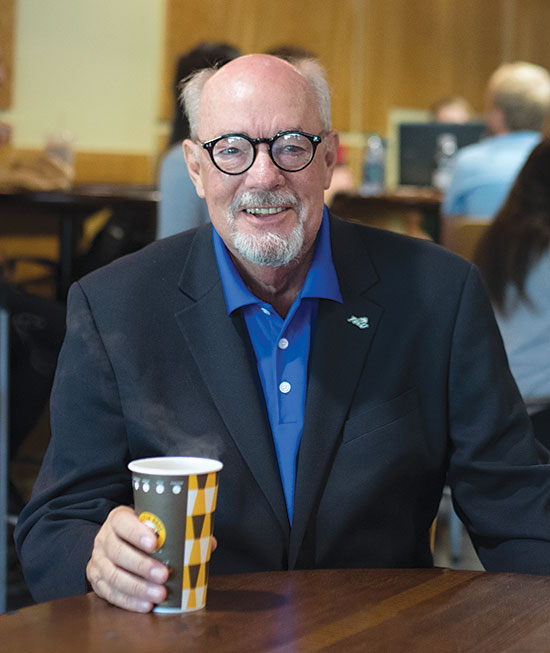
On any given morning, you’ll find President Mike Martin sitting at Einstein Bros. Bagels in the Cohen Student Union – coffee cup in hand – talking with those who make FGCU tick. The conversation is often tinged with a joke, a word you might have to look up, a personal anecdote and a bit of wisdom only a man with 50 years working in higher education can provide. It’s an uplifting sight, and despite the first worldwide pandemic in a century, weltschmerz hasn’t set in with this septuagenarian.
“From the time I went away to college to today, I have lived by this same, simple mantra: ‘I will only do a job if I can promise myself it’s interesting, rewarding and fun.’ Now it doesn’t have to be all of those every day, and if no one else makes it fun, I will. People might get annoyed, but this is part of my responsibility to myself,” Martin said with a laugh.
Martin’s approachability has established him as “the people’s president,” but he’s clear about what matters. He values scholarship. He appreciates the opportunity to evaluate a situation and make the best decision possible. He expects people to do their jobs. He is squarely focused on making a difference in the lives of young people in Southwest Florida.
“I’ll tell you what the best moments are always for me: when the students come back, and commencement when everyone celebrates,” Martin said. “I think what’s been gratifying is we turned the corner on a number of issues that have better stabilized the finances of this place.”
It didn’t take Martin’s economic training to see the university was in trouble in the summer of 2017. Just before he took the reins, FGCU lost $8 million in performance-based funding, a ranking system determined by 10 metrics that evaluates Florida public institutions on a range of issues. This reduction was an unwelcome, but not unexpected, start to the Martin presidency.
“It struck me early on that the most important sustainable issue [for FGCU] was economic sustainability. When you’re in the bottom three [of performance-based funding rankings], you take an $8 million hit your first day on the job, a variety of things like that cause you to say, ‘We’ve got to tee it up and make this place financially sound, so that the campus we’ve inherited really has a useful purpose that can be carried out,’” Martin said.
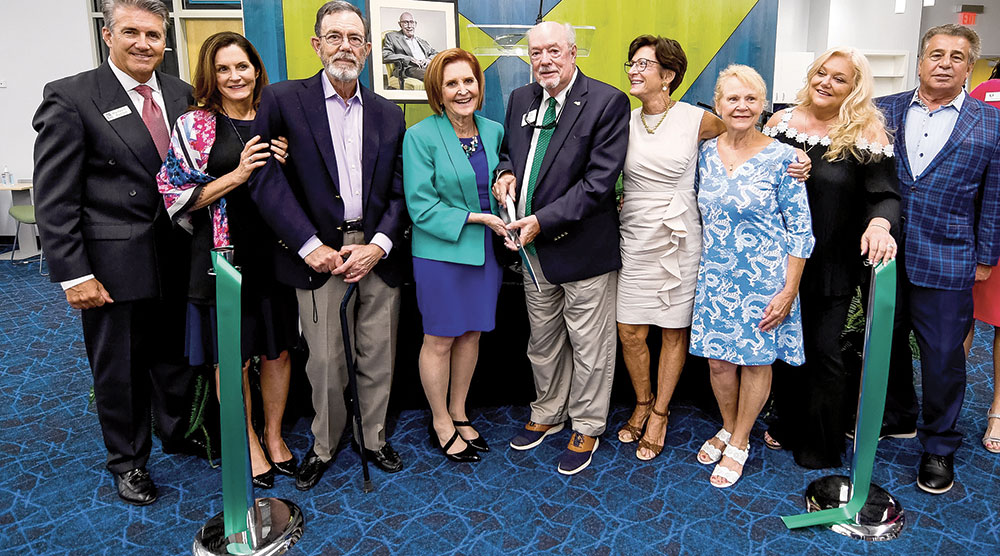
Within days of becoming the university’s president, Martin had plans to increase FGCU’s recurring operational funding. He wanted the legislature to give FGCU $32 million. To date, and in spite of the pandemic, he’s secured more than $23.7 million.
“I understand the need and the desirability of pursuing the 10 metrics, but there’s one big metric in my head that I always think we should be pursuing. That’s pursuing the day when every citizen of Southwest Florida has a very personal reason to be glad FGCU is here,” Martin said.
More than money
Beyond the funding, Martin laid out several goals, which he covered in a fall 2017 interview with FGCU360 magazine. The strategic plan needed to be revamped. Student outcomes left much to be desired. “Upping our game,” he said, in graduate studies, including the creation of FGCU’s first Ph.D. programs, must happen. A new school focused on water was on the horizon. And, by the way, there would not be a football team during his time as president.

A new strategic plan, complete with five pillars, debuted before the end of his first six months on the job. The first pillar is “student success,” and Martin moved on it early in 2018. Mitch Cordova, Ph.D., then dean of Marieb College of Health & Human Services, became FGCU’s first vice president for student success and enrollment management. Cordova and his team created an entirely new division that led FGCU to make significant strides between 2017 and 2020:
- The 4-year graduation rate improved by almost 19 percentage points.
- The 6-year graduation rate rose 4.6 percentage points.
- Net cost of tuition and fees decreased 48% for those who completed their degree in four years instead of six.
“Mitch’s leadership, in putting together a team and initiative, and his natural competitiveness, which will not allow him to fail, had a lot to do with that,” Martin said.
Getting others to “buy in” to this approach was key.
“This is a case where it took a village, and we had a village,” Martin said. “But it does, I think, reflect the fact that we reemphasized, reinvested in and held people accountable for getting it done.”
In addition to Cordova’s efforts, the president points to the work of advisers and faculty for helping move the student success initiative forward. Add to that the value of the entrepreneurship and integrated studies majors. The programs are led, respectively, by Sandra Kauanui, Ph.D., and Maria Roca, Ph.D.
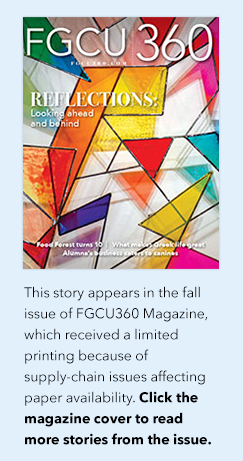 “I think Maria Roca [through integrated studies] gave us an approach for students to self-design a degree that they really got engaged in,” Martin said. “The inspiration that’s come out of the entrepreneurship school, led by Sandy, gives people a sense that ‘I’ve learned something; I want to get out there and put it into action as an entrepreneur.’
“I think Maria Roca [through integrated studies] gave us an approach for students to self-design a degree that they really got engaged in,” Martin said. “The inspiration that’s come out of the entrepreneurship school, led by Sandy, gives people a sense that ‘I’ve learned something; I want to get out there and put it into action as an entrepreneur.’
“In both instances, [the majors have] been magnets for students – internally and externally – to find a new home and a place to go with their education, and an incentive to get out and make a difference.” Despite the pandemic, enrollment is soaring. This fall, FGCU enrollment approached 16,000 students. To say the least, student outcomes are improving.
With the strategic plan’s fourth pillar – health sciences – the most significant impact occurred in counseling. Martin oversaw the completion of a building to house Counseling and Psychological Services for students and the Community Counseling Center to support members of the public. It makes sense that earlier this year, FGCU doubled down in this area by announcing plans to develop a doctoral program in counselor education and supervision. If approved, this would be FGCU’s first Ph.D. offering.
Although it’s not a pillar in the strategic plan, The Water School officially launched in March 2019. It will anchor the campus’ newest and most prominent building when it opens in February. In two years, the school has attracted significant local, state and national attention.
“It’s easy, I think, to champion The Water School because it hit just at the right time,” said Martin. “All of these great fortunes, think about it. We dream up The Water School just prior to being told that we have to have an area of distinction by the [Florida Board of Governors] and the legislature. We already had one. That’s another one of those cases where you say, ‘Maybe we’re good, but we’re darn sure lucky.’”
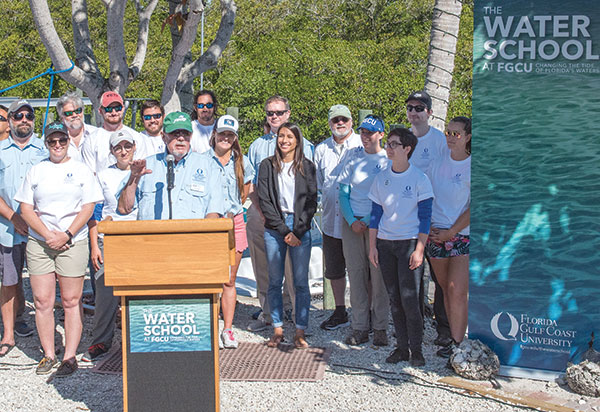
Entrepreneurship is another critical, strategic plan-related achievement. Beyond the aforementioned enrollment success, the program has grown from a minor to a major to a school offering a master’s program. Kauanui, director of the Daveler & Kauanui School of Entrepreneurship, and the FGCU Foundation secured more than $8 million in philanthropic gifts to build a new facility – Lucas Hall. For the past three years, the Princeton Review and Entrepreneur magazine ranked the undergraduate entrepreneurship program among the nation’s best. This year, it ranked 22 in the nation.
“All those things are interesting, but, you know, part of it is having the place believe in itself enough that we develop a little swagger. I don’t mean cockiness; I mean a certain amount of swagger. It took a little while to get people to believe that you don’t have to apologize for being the new kid on the block,” Martin said.
What’s next?
No one can bypass the challenges Martin faced leading an institution through a pandemic. Even now, COVID-19’s impact on FGCU is not fully defined. The president is intimately involved in the campus response, but he still takes time to look for the silver lining.
“This is a historically tragic time in human history,” Martin said. “If nothing else positive came out of it, the pandemic has revealed to me people I did not know, but I have come to discover how good they really are, and those are some of the things that are greatly satisfying.”
The stress levied on employees and students due to COVID-19 is significant. That has directed the president’s attention to the way people interact. Simply, there are a couple of things he expects.
“We continue to build the notion that if you’re going to be a participant in the academy, the first and most important value is collegiality and civility toward one another,” Martin said. “That you can’t measure, and you never know if you have a legacy, but, for me, that’s important.”
When it comes to race-related issues, some progress has been made. FGCU opened the Center for Critical Race and Ethnic Studies under the direction of Ted Thornhill in 2020. The Black Faculty and Staff Association also formed that year.
“We try to be as proactive as possible, but oftentimes it is reactive,” Martin said. “We hope that becomes part of our core value system, and it starts with some elementary principles – the fundamental respect of everyone, no matter who they are as a member of our species, with the rights to have ‘life, liberty and the pursuit of happiness.’”
As a 40-year member of the NAACP and champion of Native American issues, Martin would like to have delivered greater racial diversity among the faculty and staff ranks at FGCU. It’s an issue on which he and Provost Mark Rieger are focused.
“I’d hoped to have more progress. We’ve been able to do a little bit more at the administrative level because we could do it a little more targeted. We’ve hired high-quality people who also send the message that we embrace differences here for the sake of the strength of the institution,” Martin said.
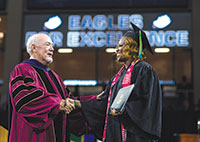
Calling it a “fundamental objective,” Martin wants to have at least the university’s faculty and staff ranks reflect the racial makeup of the region. He hopes to see more recruiting from historically Black colleges and universities. Provost Rieger has also talked about the importance of creating a pipeline.
“If we just hire professors of color away from other institutions, we’re not addressing the larger issue – making higher education a desired avenue for the people we seek to attract,” Rieger told FGCU360.com in November 2020. “If we want more people of color working in academia, we must start at the pipeline.”
As previously reported, Rieger believes FGCU’s focus on undergraduate education is the right place, with student success at the forefront, for him to create programs that inspire scholars to earn master’s and doctoral degrees.
“So, when we have a student who goes on and gets their Ph.D., we need to invite them back for a seminar and offer them a job. We have to get behind the longer-term approaches. We have to spend some money on summer programs, honors programs and senior thesis programs to get students excited about discovery. And when they do, they will likely have that intrinsic motivation that takes them to a Ph.D.”
Setting a timeline

It’s no secret that Martin has fewer days ahead of him at FGCU than he has behind him. He was already eyeing retirement when he left the chancellorship of the Colorado State University System, but FGCU beckoned. Nearly four-and-a-half years later, the president has spent more time leading this institution than any of his previous posts at New Mexico State University, Louisiana State University or the aforementioned system.
“I’ve always thought I better know what I can get done and what I can’t. Starting to fake it is not in anyone’s best interest,” he said. “So, you bring your agenda. You run as hard as you can. You get to the end of that agenda, and you hand the baton off to the next person.”
As of now, Martin plans to retire from FGCU in December 2022. He isn’t looking for another job. That’s made his decision-making process much less political.
“I have the advantage of being at the end of my career, and I have a little latitude that others don’t,” Martin said. “I care, but I don’t care about the outcome for me. The outcome for me has now been largely defined in almost every way.”
The president will watch the university take its next steps from afar. FGCU will have just turned 25, and a new leader will kick-start the second quarter-century. Like the FGCU leaders who came before him, Martin has played an important role in shaping the university for future generations to enjoy.
“I think we’ve had the good fortune of being able to do some things in these five years that have been meaningful. I don’t want to take any credit for it. However, I want to acknowledge that this administration, my administration, has allowed them to happen. That’s been a good, fun thing to see.”
